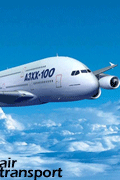Thursday, April 24, 2008
Fuel efficiency standards for both passenger vehicles and light trucks would increase by 4.5 percent per year over the five-year period ending in 2015 - a 25 percent total improvement that exceeds the 3.3 percent baseline proposed by Congress last year - under an ambitious new proposal announced today by U.S. Transportation Secretary Mary E. Peters.
"This proposal is historically ambitious, yet achievable," Secretary Peters said. "It will help us all breathe a little easier by reducing tailpipe emissions, cutting fuel consumption and making driving a little more affordable."
For passenger cars, the proposal would increase fuel economy from the current 27.5 miles per gallon to 35.7 miles per gallon by 2015. For light trucks, the proposal calls for increases from 23.5 miles per gallon in 2010 to 28.6 miles per gallon in 2015.
All told, the proposal will save nearly 55 billion gallons of fuel and a reduction in carbon dioxide emissions estimated at 521 million metric tons. The plan will save America's drivers over $100 billion in fuel costs over the lifetime of the vehicles covered by the rule, Secretary Peters said.
As required by Congress, the proposed rule allows for automakers to earn credits for exceeding Corporate Average Fuel Economy, or CAFE, standards. This will serve as an incentive for companies to exceed these goals while giving manufacturers flexibility to meet the standards without compromising their economic vitality. The goal is to save fuel, not endanger jobs, Secretary Peters said.
"Looking at the fuel-efficient technologies already available, it's easy to see a not-too-distant future when cars fueled by something other than gasoline will be readily available and affordable," Secretary Peters said. "Until that time, however, we will continue to do what we can, safely and efficiently, to improve gas mileage and help consumers spend less time and less money at the pump."
Over the last six years, the Administration has twice made changes to the nation's CAFE standards, including the first since 1975 to increase mileage requirements for light trucks. Last year, President Bush called for an energy plan that goes even further by requiring attribute-based fuel efficiency standards for passenger vehicles.
"This proposal is historically ambitious, yet achievable," Secretary Peters said. "It will help us all breathe a little easier by reducing tailpipe emissions, cutting fuel consumption and making driving a little more affordable."
For passenger cars, the proposal would increase fuel economy from the current 27.5 miles per gallon to 35.7 miles per gallon by 2015. For light trucks, the proposal calls for increases from 23.5 miles per gallon in 2010 to 28.6 miles per gallon in 2015.
All told, the proposal will save nearly 55 billion gallons of fuel and a reduction in carbon dioxide emissions estimated at 521 million metric tons. The plan will save America's drivers over $100 billion in fuel costs over the lifetime of the vehicles covered by the rule, Secretary Peters said.
As required by Congress, the proposed rule allows for automakers to earn credits for exceeding Corporate Average Fuel Economy, or CAFE, standards. This will serve as an incentive for companies to exceed these goals while giving manufacturers flexibility to meet the standards without compromising their economic vitality. The goal is to save fuel, not endanger jobs, Secretary Peters said.
"Looking at the fuel-efficient technologies already available, it's easy to see a not-too-distant future when cars fueled by something other than gasoline will be readily available and affordable," Secretary Peters said. "Until that time, however, we will continue to do what we can, safely and efficiently, to improve gas mileage and help consumers spend less time and less money at the pump."
Over the last six years, the Administration has twice made changes to the nation's CAFE standards, including the first since 1975 to increase mileage requirements for light trucks. Last year, President Bush called for an energy plan that goes even further by requiring attribute-based fuel efficiency standards for passenger vehicles.
posted by transport blogs
@ 12:14 AM
permanent link | Post a Comment
|
![]()








